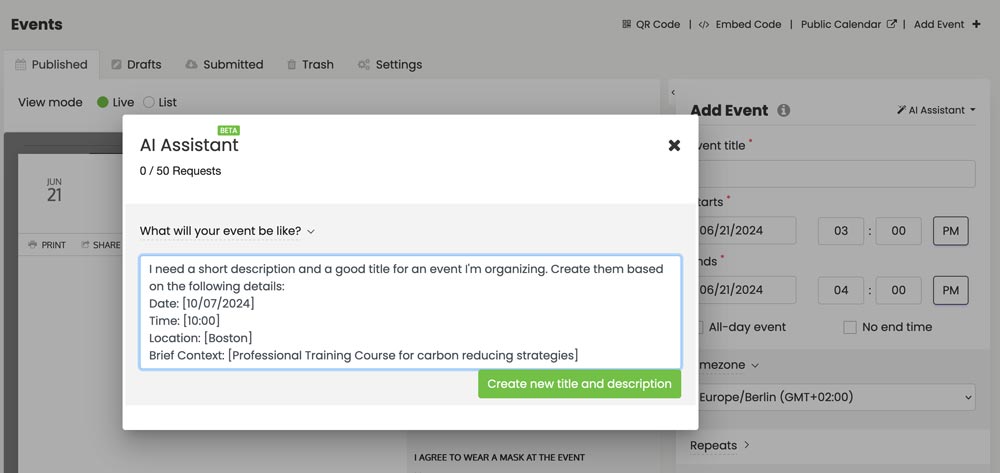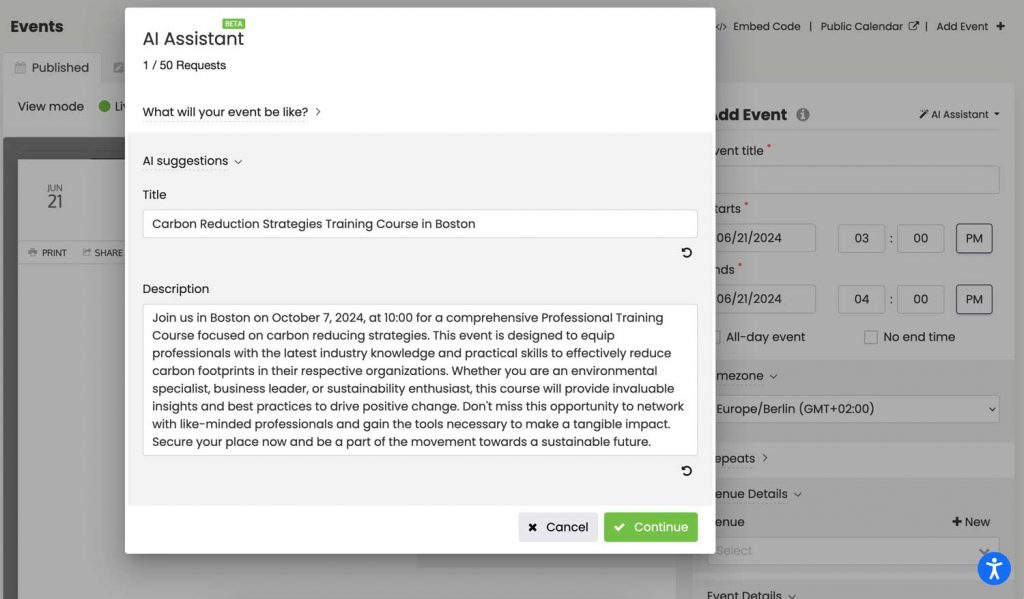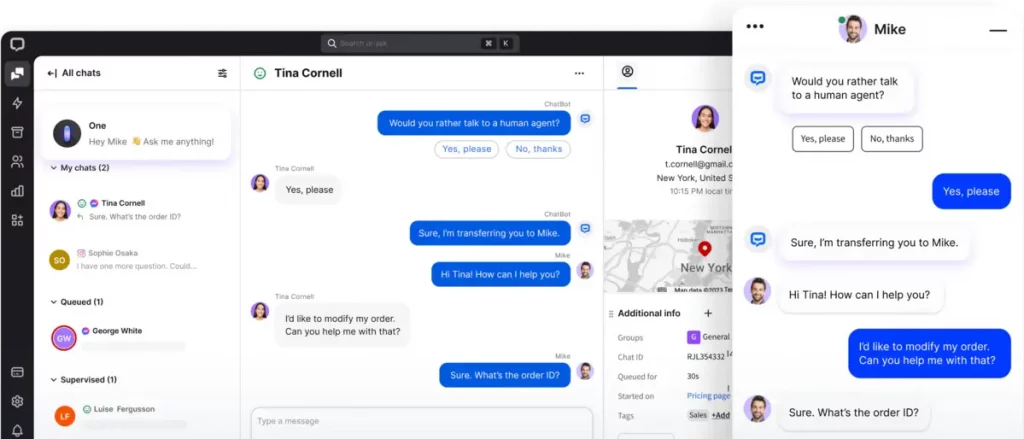
AI in Training and Development: 20 Practical Applications
In today's fast-paced digital world, organizations are constantly seeking innovative solutions to enhance their training and development programs. With the rise of Artificial Intelligence (AI), there has been a paradigm shift in how we approach learning. AI has the potential to transform the learning experience by personalizing training programs, improving engagement, and boosting overall performance. In this article, we will explore 20 practical ways to use AI in training and development programs.
I. The Importance of Artificial Intelligence in Learning and Development
Organizations are increasingly using AI to transform traditional training methods and enhance employee skills. Using Artificial Intelligence for training can help them personalize learning experiences, optimize training processes, and promote continuous improvement in performance.
By analyzing data, AI provides insights into learner behavior and preferences, allowing for customized training programs tailored to individual learning styles and career goals. AI-powered algorithms deliver targeted content, recommend personalized learning paths, and offer real-time feedback, boosting engagement and knowledge retention.
Artificial Intelligence in training also facilitates collaboration and knowledge sharing among employees across different locations and time zones through virtual learning communities and peer-to-peer learning. This interconnected approach enhances knowledge transfer, engagement, retention, and satisfaction.
AI's predictive analytics capabilities allow organizations to forecast learning trends, identify skills gaps, and recommend interventions, ensuring alignment with industry trends and strategic priorities. Further, this proactive approach optimizes training investments and equips employees with the necessary skills for business success in a rapidly changing marketplace.

II. 20 Practical Ways to Use AI in Training and Development
By harnessing the power of Artificial Intelligence, organizations can deliver training programs that are efficient, immersive, and tailored to their employees' specific needs. Embracing AI in training and development is no longer a luxury but a necessity for organizations aspiring to stay competitive and empower their workforce for success.
So, let's dive in and explore 20 practical ways you can leverage AI for training and development initiatives and unlock a new level of performance and growth.
1. Brainstorming Ideas for Training Programs
Brainstorming ideas for training programs can be challenging, but AI-powered tools streamline the process by generating creative ideas, identifying learning objectives, and designing programs. By analyzing employee performance, skills gaps, and training needs, AI suggests relevant topics, formats, and delivery methods, ensuring alignment with organizational goals and industry trends. AI also provides insights into the effectiveness of training programs, enabling continuous improvement and optimization of training strategies.
2. AI Custom Course Syllabus
AI-powered personalized course syllabi provide organizations with a strategic advantage by designing and delivering engaging and effective training programs tailored to the diverse needs of employees. Since, by analyzing learner data, recommending personalized learning paths, and adapting content in real-time, AI creates tailored learning experiences that enhance engagement, knowledge retention, and performance. Lastly, this custom approach fosters a culture of continuous learning, empowers employees to acquire new skills, and drives organizational success in a competitive and rapidly evolving business environment.
3. Creative Training Course Titles and Descriptions
AI can also help enhance the creation of compelling training course titles and descriptions. Using natural language processing, AI identifies impactful keywords and phrases that resonate with the target audience, leading to more effective course promotions.
One notable tool in this domain is the Timely AI Content Assistant, which integrates directly into the Timely Training Management platform. This assistant not only aids in generating captivating course titles and descriptions but also ensures they are tailored to maximize engagement and appeal. By leveraging Timely AI Content Assistant, organizations can streamline their content creation process and boost the effectiveness of their training programs.


4. Unique Creative Art for Course Promotion
Another practical use of AI in training and development is creating visually appealing and informative promotional materials for training programs. By analyzing design trends, color schemes, and imagery preferences, AI suggests personalized creative assets that align with the brand identity and appeal to the target audience. This customization not only boosts the visual appeal of training promotions but also establishes a strong and memorable brand presence, differentiating training offerings and driving higher participation rates.
4. AI in Training with Video Prompts and Teasers
AI Video Prompts and Teasers enhance employee engagement in training programs by creating custom content based on user behavior and preferences. Further, this custom video content increases engagement, retention, and knowledge transfer. Additionally, Artificial Intelligence tracks learner interactions with videos, providing insights into engagement patterns. This data helps optimize training programs, identify improvement areas, and create more effective learning experiences.

5. AI Translated Content Reaching a Broader Audience
In today's global business environment, AI-powered translation tools are essential for delivering inclusive and accessible training content in multiple languages. These tools use machine learning algorithms to accurately translate text, audio, and video content while preserving context and meaning, enabling organizations to reach a diverse audience.
By having their course promotion materials translated into several languages, training providers can significantly expand their audience, tapping into new markets and demographics. This increased reach not only fosters greater inclusivity but also drives revenue growth and business expansion. As a result, organizations can leverage these AI translation tools to enhance their global presence and competitive edge in the marketplace.
6. Social Media Content for Course Promotion
AI-powered tools can enhance social media content for promoting training programs by analyzing data to identify trends and audience preferences. Furthermore, this enables organizations to create targeted content that generates interest and drives enrollment. Artificial Intelligence also automates scheduling and posting, saving time and resources. Leveraging AI in social media marketing helps organizations effectively promote training programs and engage employees in the learning process.
7. Summarizing Content with AI in Training
Another great use of AI in training is content summarization. AI tools make summarizing complex content for courses more efficient by analyzing large volumes of information, extracting key concepts, and condensing content into concise formats. This automation saves time and resources in developing training materials. Additionally, AI can customize summaries based on individual learning styles, preferences, and knowledge gaps, ensuring tailored training materials. This personalized approach enhances learning outcomes, improves knowledge retention, and increases the effectiveness of training programs.
8. Leveraging AI for Training Content Creation and Delivery
Artificial Intelligence in training can streamline the creation and delivery of content by automating repetitive tasks and optimizing workflows. Further, AI-powered tools can generate training materials, quizzes, assessments, and simulations based on specific learning objectives and performance metrics. These tools adapt content formats and delivery methods to individual employee preferences and learning styles. By automating these processes, organizations can scale their training initiatives, reduce time-to-market, and ensure consistent, high-quality materials. This allows L&D teams to focus on strategic planning and instructional design rather than manual content production.
9. AI-Generated Images for Training Materials
AI-generated images enhance training materials by captivating learners' attention and reinforcing key concepts. Furthermore, AI-powered tools create custom illustrations, infographics, and visual aids tailored to the content and objectives of training programs. These unique images increase engagement, comprehension, and information retention. By analyzing training content and identifying relevant visual elements, Artificial Intelligence generates images that resonate with learners, making training materials more engaging, memorable, and impactful, ultimately leading to improved learning outcomes and performance.
10. Enhancing Employee Onboarding
Artificial Intelligence in training can transform employee onboarding by providing personalized guidance, and resources. Since AI-powered platforms create customized learning paths based on each employee's role, department, and skill level, ensuring relevant training materials. By automating routine tasks, AI enhances onboarding efficiency and effectiveness, leading to higher employee satisfaction and retention rates.
11. Using AI for Skills Assessment and Gap Analysis
AI tools are essential for identifying skills gaps within an organization, enabling the design of targeted training programs to improve employee performance. Further, by analyzing employee performance data, feedback, and skill proficiency levels, Artificial Intelligence leverages machine learning algorithms to identify patterns and pinpoint areas needing additional training. This data-driven approach helps organizations make informed decisions about training priorities, resource allocation, and performance improvement strategies. Moreover, AI-powered skills assessment tools provide valuable insights into the organization's current skill landscape, allowing HR and L&D teams to create training programs aligned with business objectives and employee development goals.
12. AI for Interactive Training Modules and Gamification
Using artificial intelligence for interactive training modules and gamification can transform traditional training programs into engaging and interactive learning experiences. By incorporating AI-powered gamification elements such as leaderboards, badges, and rewards, organizations can motivate employees to participate in training activities, enhance learning retention, and increase knowledge transfer.
13. AI-Powered Virtual Reality for Immersive Training Experiences
Integrating AI algorithms into virtual reality (VR) training creates highly immersive and interactive experiences that simulate real-world scenarios. Moreover, AI enhances realism and effectiveness by dynamically adjusting difficulty based on learner performance, promoting skill development and knowledge retention.
Additionally, AI-powered VR platforms collect and analyze data on learner interactions and decision-making, offering insights into individual learning styles and preferences. This data personalizes training experiences and optimizes learning outcomes. Combining AI and VR technologies allows organizations to deliver engaging, impactful, and memorable training that drives performance improvement and skill development.
14. AI-Enabled Chatbots for Enhanced Employee Support and Engagement
One interesting use of AI in training is chatbots. These tools provide personalized support to employees during training, increasing learning outcomes and engagement. Moreover, they offer instant assistance, guidance, and feedback, answering common questions and providing personalized learning recommendations based on individual progress.

Utilizing natural language processing, AI chatbots simulate human-like interactions, creating a more engaging learning environment. Additionally, they collect data on learner interactions and preferences, offering valuable insights into training effectiveness and engagement. Implementing AI chatbots as virtual learning assistants enhances the course experience, fosters continuous learning, and empowers employees to achieve their full potential.
15. Generate Smart Quizzes
AI-powered smart quizzes effectively assess employee knowledge, reinforce learning, and measure training outcomes. These quiz generators create customized quizzes based on learning objectives, content areas, and difficulty levels. Furthermore, by analyzing quiz performance, organizations can identify knowledge gaps, track progress, and evaluate training effectiveness.
Using AI for training quizzes is a great way to get instant feedback, explanations, and study recommendations, helping employees improve their understanding and retention. Smart quizzes enhance the learning experience, promote knowledge retention, and drive continuous improvement in training initiatives.
16. AI-Driven Performance Assessment and Feedback
AI-driven performance assessments and feedback can transform how organizations evaluate employee performance and provide feedback. Traditional evaluations are often time-consuming and subjective, leading to bias and inconsistency. AI-powered tools automate the evaluation process, gather objective performance data, and provide real-time feedback, saving time and resources while ensuring fairer and more accurate assessments. Additionally, AI analyzes performance data to identify patterns and trends, enabling organizations to make data-driven decisions to improve employee performance.
17. Implementing AI in Talent Management and Succession Planning
AI in training and development has the potential to transform how organizations approach talent management and succession planning. Also, by utilizing AI-powered tools, companies can analyze data to identify high-potential employees, predict future skill requirements, and create strategic development plans. Further, this data-driven approach enables businesses to make informed decisions about talent development, succession planning, and leadership pipelines.
18. Post Training Engagement
The learning and development journey extends into the post training phase, where reinforcement, application, and continuous support are essential for lasting behavior change and skill development. AI-powered post training engagement strategies help sustain learning momentum, reinforce key concepts, and provide ongoing support. Additionally, by leveraging AI algorithms to deliver personalized feedback, reminders, and resources, organizations can foster a culture of continuous learning and improvement, driving individual and organizational success.
19. Summaries for Post-Training Reports
Effective assessment and evaluation of training programs are crucial for gauging impact, effectiveness, and ROI. AI-powered summaries for post-training reports provide a data-driven approach to analyze course outcomes, identify insights, and inform decision-making. By leveraging AI algorithms to process and interpret training data, organizations can generate comprehensive summaries, performance metrics, and actionable recommendations. Finally, this enables stakeholders to assess training success, identify areas for improvement, and make informed decisions about future learning initiatives.
20. Predictive Analytics for Course Planning
Strategic course planning is crucial for aligning training with organizational goals, optimizing resources, and boosting employee engagement and performance. AI-powered predictive analytics provide a data-driven approach, enabling organizations to anticipate learner needs, identify skills gaps, and optimize courses. Further, by analyzing historical data, learner preferences, and industry trends, AI helps forecast future training requirements, recommend targeted interventions, and align courses with evolving business needs and market demands.

III. Challenges and Considerations When Using AI in Training and Development
While AI in training and development offers significant benefits, organizations face challenges in implementing AI-powered learning solutions. Key challenges include ensuring adequate data quality and quantity for training AI algorithms. As well as addressing potential bias in AI systems to ensure fairness, and prioritizing data privacy and security. Additionally, organizations must invest in training and upskilling their workforce to effectively utilize AI, combining technical expertise and domain knowledge. Lastly, continuous employee development is crucial to maximize the potential of AI-powered learning solutions.
IV. Next Steps: Improve Learning Experiences by Leveraging AI in Training and Development
The integration of artificial intelligence into training and development programs offers a myriad of benefits for organizations. Further enhancing the effectiveness, efficiency, and engagement of their learning initiatives. From personalized learning paths to immersive VR experiences, AI enables organizations to deliver training programs that are tailored to individual needs, data-driven, and highly engaging. By harnessing the power of AI for course content creation, learner support, and skills assessment, organizations can unlock a new level of performance and growth.
Embracing AI in training and development is not just a trend but a strategic imperative for organizations. In order to stay competitive, agile, and innovative in the ever-evolving business landscape. By exploring and implementing the practical ways discussed in this article, organizations can leverage AI to transform their training and development efforts and empower their workforce for success in the digital era.
Join Timely and Streamline Your Training Management
At Timely, we are always looking to innovate and provide the greatest training management software and services to our customers. Trusted by over 150,000 event creators worldwide, Timely AI-powered software streamlines the complex process of organizing, promoting and delivering training and development programs.
Talk to one of our experts, and find out how Timely can help you manage training programs more efficiently.
Table of Contents
Event Management Updates
If you want to know more Timely company and product update news, please visit our Event Management Blog. There is always something new happening at Timely, so we do our best to keep our clients on the loop!





